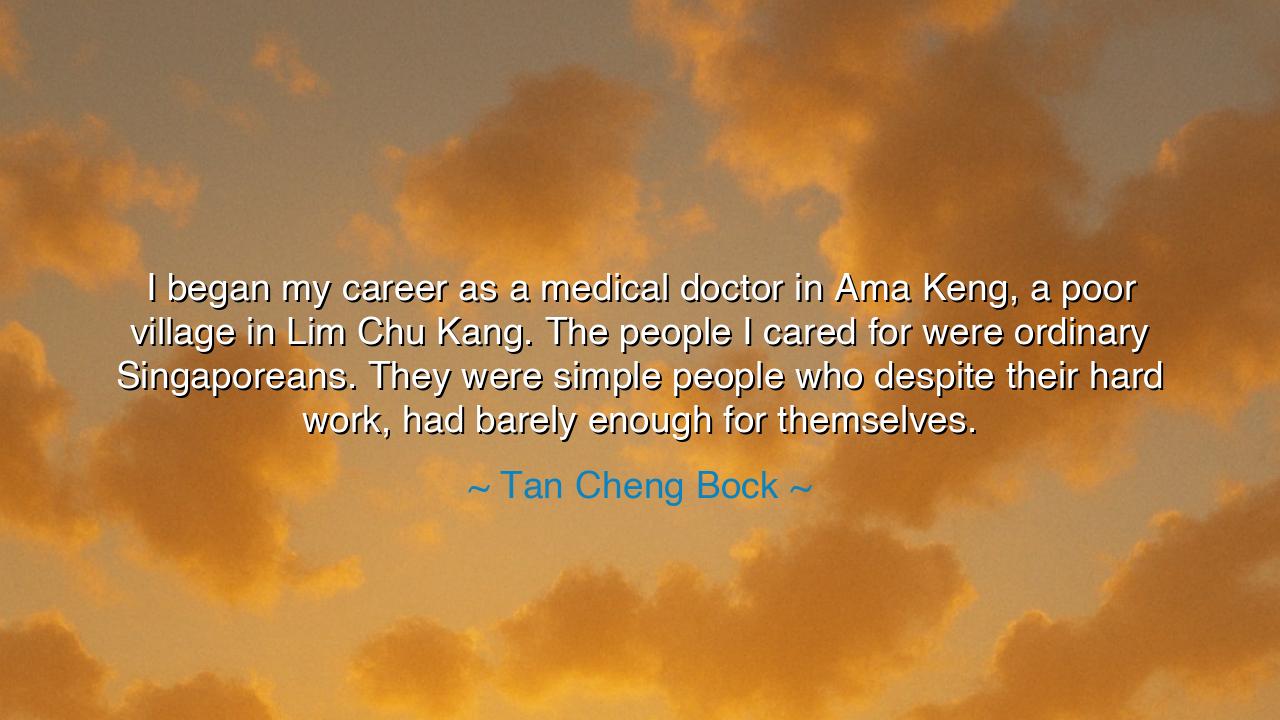
I began my career as a medical doctor in Ama Keng, a poor village
I began my career as a medical doctor in Ama Keng, a poor village in Lim Chu Kang. The people I cared for were ordinary Singaporeans. They were simple people who despite their hard work, had barely enough for themselves.






“I began my career as a medical doctor in Ama Keng, a poor village in Lim Chu Kang. The people I cared for were ordinary Singaporeans. They were simple people who despite their hard work, had barely enough for themselves.”
Thus spoke Tan Cheng Bock, physician, servant, and statesman — a man whose journey began not in palaces of privilege, but in the humble homes of those who toiled unseen. His words rise like a hymn of remembrance, carrying the scent of earth and sweat, the quiet dignity of ordinary people who labored not for glory, but for survival. In these words lies not nostalgia, but a deep reverence for the roots of compassion — the kind of wisdom that only service among the poor can awaken.
When Tan speaks of Ama Keng, he recalls more than a place. He invokes a time in Singapore’s history when the nation was still finding its feet — when villages lay far from the gleaming towers that now pierce the sky, and when poverty was not a statistic but a daily companion. In those dusty lanes and wooden houses, he learned what medicine truly meant. It was not only about curing disease; it was about healing humanity. For the people he served were rich in spirit though poor in coin, and their endurance taught him that strength is not measured by wealth, but by the will to keep moving forward despite hardship.
In those early years, the doctor of Ama Keng became more than a healer of bodies; he became a witness to the soul of a nation in its infancy. He saw mothers who starved so their children might eat, farmers who rose before dawn to wrestle with unyielding soil, laborers whose calloused hands built the foundations of the city to come. These were the ordinary Singaporeans whose quiet sacrifices made the extraordinary possible. Tan’s reflection is therefore not about himself — it is about the people who shaped him, the unsung heroes whose endurance became the moral backbone of his calling.
His words remind us of an ancient truth: that the greatest leaders are those who first learn to serve. In the old days, the philosopher-kings of China were taught that to govern a state, one must first walk among the poor. Likewise, Tan Cheng Bock’s compassion was forged in the crucible of humility, in the cries of the sick and the gratitude of those who could pay only in smiles. His time in Ama Keng was not a footnote to his career; it was the foundation of his philosophy — that leadership must begin with empathy, and that a nation’s worth is measured by how it treats its most vulnerable.
We may find echoes of his spirit in the story of Albert Schweitzer, the great physician who left Europe’s comfort to serve in the jungles of Africa. When asked why he chose such a path, Schweitzer answered, “Because I must.” In that same sacred compulsion — that sense of duty born not of ambition but of love — we see Tan’s heart reflected. Both men understood that true service is not a sacrifice but a privilege, that the doctor’s hands are holy not because they heal, but because they touch life where it is most fragile.
From his reflection flows a timeless lesson: never forget where you began. In every life there are seasons of achievement, but it is the humble soil of our beginnings that nourishes integrity. Those who rise high must remember the ground from which they grew, for when gratitude fades, greatness turns hollow. The people of Ama Keng — poor, weary, yet unbroken — represent the wellspring of that gratitude. They remind us that prosperity is built not only on innovation and strength, but also on compassion and community.
So, let Tan Cheng Bock’s words be a lamp to those who seek meaning beyond success. Serve before you lead. Listen before you command. Remember before you forget. For wisdom is not born in comfort, but in contact with the suffering of others. When you walk among the simple and the struggling, you find the purest truth: that humanity, at its heart, is not divided by wealth or rank, but united by care. And when you carry that truth into your life’s work, as Tan did from Ama Keng to the nation’s stage, then every act — whether healing a wound or shaping a policy — becomes an offering to the greater good.






AAdministratorAdministrator
Welcome, honored guests. Please leave a comment, we will respond soon